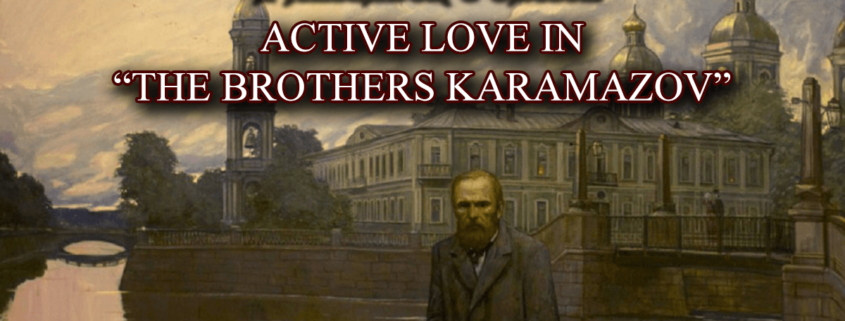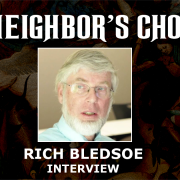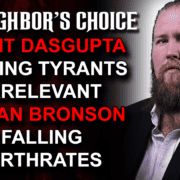Active Love in “The Brothers Karamazov”
The Brothers Karamazov is the last novel by Fyodor Dostoevsky; it was initially serialized in 1879 by Russkiy Vestnik magazine. The story of this novel, set in 19th-century Russia, details the contradictory brothers of Alexei, Ivan, and Dmitri Karamazov. Though the majority of the novel deals with the elder brother Dmitri’s attempt to clear himself of parricide, Dostoevsky was clear to remark that Alexei, the youngest brother, is the hero of his story. This may strike contemporary readers as somewhat strange, given how important Dmitri is to the plot, but it may make sense when we consider that Alexei–or “Alyosha”–is the one who is the most involved in the story’s spiritual progression.
It is worth noting that Dostoevsky named this character Alexei after his three-year-old son who had died of epilepsy. As we will observe, the writer’s grief of losing his child echoes throughout the novel in many forms, and it is not surprising that in virtually all of these echoing, Alyosha is present. Also in the novel, Dostoevsky exposes Alyosha to the parable of the Grand Inquisitor narrated by his atheist brother Ivan; this causes one to wonder why there is such an emphasis on the spiritual dimension to Alyosha’s journey.
At the beginning of the novel, Alyosha is shown to be a novice in a monastery who sits at the feet of Elder Zosima, a monk who works miracles and comforts those in grief. The epithet “lover of humanity,” often reserved for Christ in Orthodox Christianity, is strangely applied by the writer to Alyosha. It becomes obvious through Alyosha’s humility and reluctance to condemn anyone that the writer intends for him to be a type of Christ figure. And for Alyosha, the Christ figure is Elder Zosima. Many of Zosima’s teachings quite evidently leave a lasting impression on Alyosha, and paradoxically, it is Zosima who urges Alyosha to leave the monastery and go out into the world.
Why does Zosima urge Alyosha to leave the monastery? Could it be that Dostoevsky wanted the reader to doubt the ascetic life and ultimately discredit it? That seems hardly the case when we consider how many times Dostoevsky frequented the Optina Monastery for guidance and prayers for his deceased son. Rather, it makes much more sense to note that Dostoevsky wanted to exhibit the point derived from Zosima’s conversation with the widow Katerina Khokhlakov.
“I work for pay and demand my pay at once, that is, praise and a return of love for my love. Otherwise I’m unable to love anyone!”1 the widow says. The Elder encourages this “lady of little faith” to focus on what he calls “active love.” “Love in dreams,” the elder says, “thirsts for immediate action, quickly performed, and with everyone watching… Whereas active love is labor and perseverance, and for some people, perhaps, a whole science.”
In his previous novel Demons, Dostoevsky had written about ideas possessing people. For example, the nihilists were motivated to destroy the very fabric of Russian society and bring about a totalitarian order which erases all distinctions. In Brothers Karamazov, there is possession of a different kind of idea that comes through positive influence from Elder Zosima, and one that will change Alyosha’s life and the lives of others around him.
After witnessing the turmoil within the Karamazov family, Elder Zosima urges Alyosha to leave the monastery. He says:
I give you my blessing for a great obedience in the world. You still have much journeying before you. And you will have to marry—yes, you will. You will have to endure everything before you come back again. And there will be much work to do. But I have no doubt of you, that is why I am sending you. Christ is with you. Keep him, and he will keep you. You will behold great sorrow, and in this sorrow you will be happy. Here is a commandment for you: seek happiness in sorrow. Work, work tirelessly. Remember my words from now on, for although I shall talk with you, not only my days but even my hours are numbered.
What Zosima calls “love in dreams” can be seen all around us as we walk in a world fixated on the superficial. For example, It can be seen in the public relations of any celebrity or politician. The thirst for immediate applause, something Christ cautioned against in Matthew 6:2, has invaded even our own personal daily lives. With the advent of social media, it is very difficult to not get carried away whilst hunting for dopamine releases in the forms of “likes” or “retweets.” This same thirst for immediate applause can be seen in the religious sphere.
When Zosima passes away, the other monks expect, as a sign of God’s acceptance, some kind of fragrance to emanate from the Elder’s body, but this miracle does not happen and immediately the monks fall into a crisis of faith which, for Alyosha, turns into a great stumbling block. Again, it seems Dostoevsky has taken the words of Christ to heart; this time he picks his cues from Matthew 16:4. Dostoevsky counters this fickle “love in dreams” with “active love” that labors and suffers in continuity, and it is for this same love that Zosima sends Alyosha out into the world.
Active love, from another perspective, must deal with the tragedy of human freedom. Alyosha finds this out when his brother, the atheistic Ivan Karamazov, narrates the parable of the Grand Inquisitor. In this parable set during the Spanish Inquisition, Ivan presents to Alyosha the dilemma of either accepting Christ’s freedom or man’s tyranny disguised as freedom. The Grand Inquisitor, upon meeting Christ, makes the case that man cannot be completely free as Christ wills. Humanity, the Inquisitor says, needs an overarching authoritarian structure to rule itself otherwise it would turn against Christ.
Again, this false notion of freedom that humanity endows itself with gives way to immediate satisfaction that is borne out of false love. What this artificial satisfaction really means is nothing else other than momentary catharsis, and in it, there is no tireless work and perseverance. Dostoevsky, from here on, takes the long and hard route of carefully crafting his reply to Ivan’s Grand Inquisitor; the reply is the oft-overlooked story of Alyosha and the boys.
Whilst dealing with the intricacies of the Karamazov family dispute, Alyosha comes face-to-face with two boys, both of whom have had their fathers torn away in different ways. In his interactions with these two boys and their immediate loved ones, Alyosha learns what active love means and why he must “endure everything,” as Zosima said. First, Alyosha is confronted by a nine-year-old boy named Ilyusha who, upon seeing the young Karamazov, immediately starts throwing stones at him. Initially, Alyosha is puzzled as to why this boy is attacking him, but when he comes to know the reason, he cannot but feel sorry for him.
Ilyusha, like most adolescent boys, held his father in high regard, and when he witnessed his father being publicly humiliated by Alyosha’s brother, Dmitri, his entire world came crashing down. His schoolmates start taunting him and this causes the proud but frail Ilyusha to lash out in violent ways, including tormenting his dog to death, under the influence of a nihilist, and stabbing his best friend and role model, 14-year-old Kolya Krasotkin, in the leg with a penknife. The importance of preserving the dignity of fatherhood cannot be made greater within these pages, and Dostoevsky highlights this issue with utmost accuracy and empathy. In an age when fatherhood is vilified and children are neglected, Dostoevsky’s words ring truer than ever.
Active love, in complete opposition to the world, means that Alyosha cannot ignore the plight of the young boy, and so he attempts to make up for the family’s wounded dignity by apologizing to the boy’s father. When Alyosha tries to compensate the boy’s father, he learns that active love must not even attempt, however inadvertently, to diminish the pride of the wounded. The boy’s father, the timid patriarch of a poor family, is at first delighted, but then he throws the money to the ground and tearfully asks: “… What would I tell my boy, if I took money from you for our disgrace?”
Alyosha, in keeping with perseverance from active love, does not stop visiting Ilyusha’s family. Later in the novel, Ilyusha’s health deteriorates from tuberculosis and it becomes apparent, much to the dismay of his parents, that he is dying. Alyosha sees this tragedy unfolding before him and begins to bring Ilyusha’s schoolmates one by one through his positive influence. Dostoevsky writes:
His [Alyosha’s] art in this case lay in getting them together one by one, without “sentimental slop,” but as if quite unintentionally and inadvertently. And this brought enormous relief to Ilyusha in his suffering. Seeing an almost tender friendship and concern for him in all these boys, his former enemies, he was very touched.
Here Alyosha discovers that active love must not overemphasize its worth in order to be effective, especially in acts of reconciliation. Alyosha uses the same approach when interacting with Kolya, a self-professed socialist and prankster, also a fatherless figure. Kolya, not one for “sentimental slop,” refuses to visit Ilyusha the first few times, but Alyosha’s persistence pays off. When Kolya visits Ilyusha at his bedside, he can’t help but stroke the pale boy’s head. Ilyusha, on the other hand, finds himself jumping out of his bed with joy when he sees that Kolya has brought him a new dog who looks just like the one that had died.
Earlier in the novel, Ivan Karamazov spoke of the horrible suffering of children; he asked his brother, Alyosha, how God could allow such things to happen. Yet here stood Alyosha amongst children, and caring for one who is indeed suffering. The socialist Kolya challenged Alyosha to admit that Christianity is frequently used to oppress the marginalized. But by the end of the novel, he proclaims, “Oh, if I, too, could sacrifice myself some day for the truth!” With these examples, we learn that Dostoevsky’s apologetics for Christianity is unlike any other. The existentialist Berdyaev writes:
Dostoevsky was, first of all, a great anthropologist, an investigator of human nature, its depth and its mystery. All his creativity–is of anthropological experiences and experiments… He produced his anthropological investigations through artistry, whilst drawing on the mysterious depths of human nature. Within these depths always there is involved a frenzied and ecstatic whirlwind. And this whirlwind is a method of anthropological revealings. Everything written by Dostoevsky is of a whirlwind-like anthropology, everything there is revealed in an ecstatic-fiery atmosphere.2
For Dostoevsky, active love must always echo the Christ who washes the feet of His disciples. It must involve tireless work and much endurance, as Elder Zosima puts it. With the countless conflicts and tragedies that we see around us today, are we ready to endure suffering and help the fatherless? Are we ready to become Christ and wash the feet of our neighbors?
- All quotations from The Brothers Karamazov are taken from the Pevear and Volokhonsky translation.
- http://www.berdyaev.com/berdiaev/berd_lib/1918_294.html










Leave a Reply
Want to join the discussion?Feel free to contribute!